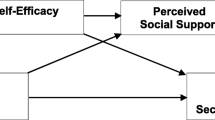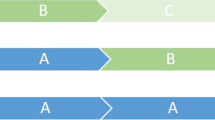Abstract
Objective
To experimentally investigate whether appealing to fear promotes Internet behaviors for stress and mental health in workers who highly underestimate the risk of stress.
Methods
Fearful and non-fearful information on stress and depression were provided to 424 middle-aged male workers with high stress underestimation in web settings (fear and control conditions). Immediately after the provision of the information, four web links were presented to test whether the participants approached information on stress and mental health (Internet behavior survey). Furthermore, their emotional reactions to the information provided and their performance on the recall test conducted a month later were investigated.
Results
In the analyses for all participants (n = 424), there were no significant differences in any outcomes between the control and fear conditions, but in analyses for participants with a certain level of depressive symptoms (K6 score ≥ 1, n = 211), participants in the fear condition exhibited stronger emotional reactions (e.g., anxiety) and approached information on stress and mental health than participants in the control condition. There were no significant differences in the performance on the recall test between the two conditions.
Conclusions
Appealing to fear could be effective in facilitating Internet behaviors in the context of promoting self-care behaviors for stress and mental health in middle-aged male workers with high stress underestimation and a certain level of depressive symptoms.


Similar content being viewed by others
Data availability
The data are available upon reasonable request from the corresponding author.
Appealing to fear to promote self-care behaviors for stress: A web-based experimental study in middle-aged workers
References
Akram, Z., McClelland, A., & Furnham, A. (2018). The effect of fear-inducing content on memory for advertisements and on retroactive and proactive interference of programme information. Applied Cognitive Psychology, 32(4), 413–419. https://doi.org/10.1002/acp.3409
Bonde, J. P. (2008). Psychosocial factors at work and risk of depression: A systematic review of the epidemiological evidence. Occupational and Environmental Medicine, 65(7), 438–445. https://doi.org/10.1136/oem.2007.038430
Chesney, E., Goodwin, G. M., & Fazel, S. (2014). Risks of all-cause and suicide mortality in mental disorders: A meta-review. World Psychiatry, 13(2), 153–160. https://doi.org/10.1002/wps.20128
Collins, R. L., Taylor, S. E., Wood, J. V., & Thompson, S. C. (1998). The vividness effect: Elusive or illusory? Journal of Experimental Social Psychology, 24, 1–18. https://doi.org/10.1016/0022-1031(88)90041-8
Deng, K., Tsuda, A., Horiuchi, S., & Aoki, S. (2022). Processes of change, pros, cons, and self-efficacy as variables associated with stage transitions for effective stress management over a month: A longitudinal study. BMC Psychology, 10(1), 122. https://doi.org/10.1186/s40359-022-00822-8
Dillard, J. P., Plotnick, C. A., Godbold, L. C., Freimuth, V. S., & Edgar, T. (1996). The multiple affective outcomes of AIDS PSAs: Fear appeals do more than scare people. Communication Research, 23, 44–72. https://doi.org/10.1177/009365096023001002
Di Plinio, S., Aquino, A., Haddock, G., Alparone, F. R., & Ebisch, S. J. H. (2023). Brain and behavioral contributions to individual choices in response to affective-cognitive persuasion. Cerebral Cortex, 33(5), 2361–2374. https://doi.org/10.1093/cercor/bhac213
Dolinski, D., Kulesza, W., Muniak, P., Dolinska, B., Węgrzyn, R., & Izydorczak, K. (2022). Media intervention program for reducing unrealistic optimism bias: The link between unrealistic optimism, well-being, and health. Applied Psychology: Health and Well-Being, 14(2), 499–518. https://doi.org/10.1111/aphw.12316
Eller, N. H., Netterstrøm, B., Gyntelberg, F., Kristensen, T. S., Nielsen, F., Steptoe, A., & Theorell, T. (2009). Work-related psychosocial factors and the development of ischemic heart disease: A systematic review. Cardiology in Review, 17(2), 83–97. https://doi.org/10.1097/CRD.0b013e318198c8e9
Furukawa, T. A., Kawakami, N., Saitoh, M., Ono, Y., Nakane, Y., Nakamura, Y., Tachimori, H., Iwata, N., Uda, H., Nakane, H., Watanabe, M., Naganuma, Y., Hata, Y., Kobayashi, M., Miyake, Y., Takeshima, T., & Kikkawa, T. (2008). The performance of the Japanese version of the K6 and K10 in the World Mental Health Survey Japan. International Journal of Methods in Psychiatric Research, 17(3), 152–158. https://doi.org/10.1002/mpr.257
Horiuchi, S., Tsuda, A., Kim, E., Hong, K., & Prochaska, M. J. (2010). Relationship between stage of change and self-efficacy for stress management behavior in Korean university students. Journal of Behavioral Medicine, 16(1), 12–20 (In Japanese).
Imamura, K., Kawakami, N., Tsuno, K., Tsuchiya, M., Shimada, K., & Namba, K. (2016). Effects of web-based stress and depression literacy intervention on improving symptoms and knowledge of depression among workers: A randomized controlled trial. Journal of Affective Disorders, 203, 30–37. https://doi.org/10.1016/j.jad.2016.05.045
Izawa, S., Yamada, H., Nakamura-Taira, N., Yamada, K. C., & Nagayama, M. (2012). A preliminary investigation in the views of stress in patients with acute myocardial infarction. The Japanese Association of Cardiac Rehabilitation, 17(2), 244–247 (In Japanese).
Izawa, S., Nakamura-Taira, N., Yamada, H., Yamada, K. C., & Haratani, T. (2013). Development of a measure to assess stress underestimation beliefs. Shinrigaku Kenkyu, 84, 57–63. (In Japanese). https://doi.org/10.4992/jjpsy.84.57
Izawa, S., Nakamura-Taira, N., & Yamada, K. C. (2016). Stress underestimation and mental health outcomes in male Japanese workers: A 1-year prospective study. International Journal of Behavioral Medicine, 23(6), 664–669. https://doi.org/10.1007/s12529-016-9557-8
Japan Institute for Labour Policy and Training. (2013). Mentaruherusu, sishoubyou nadono chiryou to shokugyouseikatu no ryouritusien ni kansuru chousa. (In Japanese)
Joyce, S., Modini, M., Christensen, H., Mykletun, A., Bryant, R., Mitchell, P. B., & Harvey, S. B. (2016). Workplace interventions for common mental disorders: A systematic meta-review. Psychological Medicine, 46(4), 683–697. https://doi.org/10.1017/S0033291715002408
Kang, J., & Lin, C. A. (2015). Effects of message framing and visual-fear appeals on smoker responses to antismoking ads. Journal of Health Communication, 20(6), 647–655. https://doi.org/10.1080/10810730.2015.1012242
Kawakami, N., Haratani, T., Iwata, N., Imanaka, Y., Murata, K., & Araki, S. (1999). Effects of mailed advice on stress reduction among employees in Japan: A randomized controlled trial. Industrial Health, 37(2), 237–242. https://doi.org/10.2486/indhealth.37.237
Kessler, R. C., Andrews, G., Colpe, L. J., Hiripi, E., Mroczek, D. K., Normand, S. L., Walters, E. E., & Zaslavsky, A. M. (2002). Short screening scales to monitor population prevalences and trends in non-specific psychological distress. Psychological Medicine, 32(6), 959–976. https://doi.org/10.1017/s0033291702006074
Kessler, R. C., Barker, P. R., Colpe, L. J., Epstein, J. F., Gfroerer, J. C., Hiripi, E., Howes, M. J., Normand, S. L., Manderscheid, R. W., Walters, E. E., & Zaslavsky, A. M. (2003). Screening for serious mental illness in the general population. Archives Of General Psychiatry, 60(2), 184–189. https://doi.org/10.1001/archpsyc.60.2.184
Lueck, J. A. (2019). Should we activate risk perceptions in the context of suicide prevention? Examining fear appeals, help-seeking determinants, and help-seeking sources among university employees who suffer from depression. Prevention Science, 20(6), 884–893. https://doi.org/10.1007/s11121-019-0979-9
Maddux, J. E., & Rogers, R. W. (1983). Protection motivation and self-efficacy: A revised theory of fear appeals and attitude change. Journal of Experimental Social Psychology, 19, 469–479. https://doi.org/10.1016/0022-1031(83)90023-9
McKinley, C. J., & Ruppel, E. K. (2014). Exploring how perceived threat and self-efficacy contribute to college students’ use and perceptions of online mental health resources. Computers in Human Behavior, 34, 101–109. https://doi.org/10.1016/j.chb.2014.01.038
Nakamura, N. (2009). The relationships among stages of change for stress management, stress responses, self-efficacy, and frequency of stress-management behavior in Japanese university students. Japanese Association School Health, 5, 24–30 (In Japanese).
Peters, G. J., Ruiter, R. A., & Kok, G. (2013). Threatening communication: A critical re-analysis and a revised meta-analytic test of fear appeal theory. Health Psychology Review, 7, 8–31. https://doi.org/10.1080/17437199.2012.703527
Rayner, E., Baxter, S. M., & Ilicic, J. (2015). Smoker’s recall of fear appeal imagery: Examining the effect of fear intensity and fear type. Australas Mark J, 23, 61–66. https://doi.org/10.1016/j.ausmj.2014.11.003
Rosenstock, I. M. (1960). What research in motivation suggests for public health. American Journal of Public Health and the Nation's Health, 50, 295–302. https://doi.org/10.2105/ajph.50.3_pt_1.295
Tannenbaum, M. B., Hepler, J., Zimmerman, R. S., Saul, L., Jacobs, S., Wilson, K., & Albarracín, D. (2015). Appealing to fear: A meta-analysis of fear appeal effectiveness and theories. Psychological Bulletin, 141(6), 1178–1204. https://doi.org/10.1037/a0039729
Tarro, L., Llauradó, E., Ulldemolins, G., Hermoso, P., & Solà, R. (2020). Effectiveness of workplace interventions for improving absenteeism, productivity, and work ability of employees: A systematic review and meta-analysis of randomized controlled trials. International Journal of Environmental Research and Public Health, 17(6), 1901. https://doi.org/10.3390/ijerph17061901
Theorell, T., Hammarström, A., Aronsson, G., Träskman Bendz, L., Grape, T., Hogstedt, C., Marteinsdottir, I., Skoog, I., & Hall, C. (2015). A systematic review including meta-analysis of work environment and depressive symptoms. BMC Public Health, 15, 738. https://doi.org/10.1186/s12889-015-1954-4
Wang, P. S., Aguilar-Gaxiola, S., Alonso, J., Angermeyer, M. C., Borges, G., Bromet, E. J., Bruffaerts, R., de Girolamo, G., de Graaf, R., Gureje, O., Haro, J. M., Karam, E. G., Kessler, R. C., Kovess, V., Lane, M. C., Lee, S., Levinson, D., Ono, Y., Petukhova, M., … Wells, J. E. (2007). Use of mental health services for anxiety, mood, and substance disorders in 17 countries in the WHO world mental health surveys. Lancet, 370(9590), 841–850. https://doi.org/10.1016/S0140-6736(07)61414-7
Weinstein, N. D. (1980). Unrealistic optimism about future life events. Journal of Personality and Social Psychology, 39(5), 806–820. https://doi.org/10.1037/0022-3514.39.5.806
Acknowledgements
This study was supported by a Research Grant for Public Health Science from Public Health Research Foundation, Japan.
Author information
Authors and Affiliations
Contributions
All the authors contributed to the study design. SI analyzed the data and prepared the first version of the manuscript. All authors critically revised the manuscript and approved the final version of the manuscript.
Corresponding author
Ethics declarations
Ethics approval
The ethics committee of Saga University approved this study (2016-27-87).
Consent to participate
Informed consent was obtained from all the participants.
Conflict of interest
The authors declare that they have no conflict of interest.
Additional information
Publisher’s Note
Springer Nature remains neutral with regard to jurisdictional claims in published maps and institutional affiliations.
Rights and permissions
Springer Nature or its licensor (e.g. a society or other partner) holds exclusive rights to this article under a publishing agreement with the author(s) or other rightsholder(s); author self-archiving of the accepted manuscript version of this article is solely governed by the terms of such publishing agreement and applicable law.
About this article
Cite this article
Izawa, S., Yamada, K.C., Nakamura-Taira, N. et al. Appealing to fear to promote self-care behaviors for stress: a web-based experimental study in middle-aged workers. Curr Psychol 43, 12601–12609 (2024). https://doi.org/10.1007/s12144-023-05364-9
Accepted:
Published:
Issue Date:
DOI: https://doi.org/10.1007/s12144-023-05364-9




